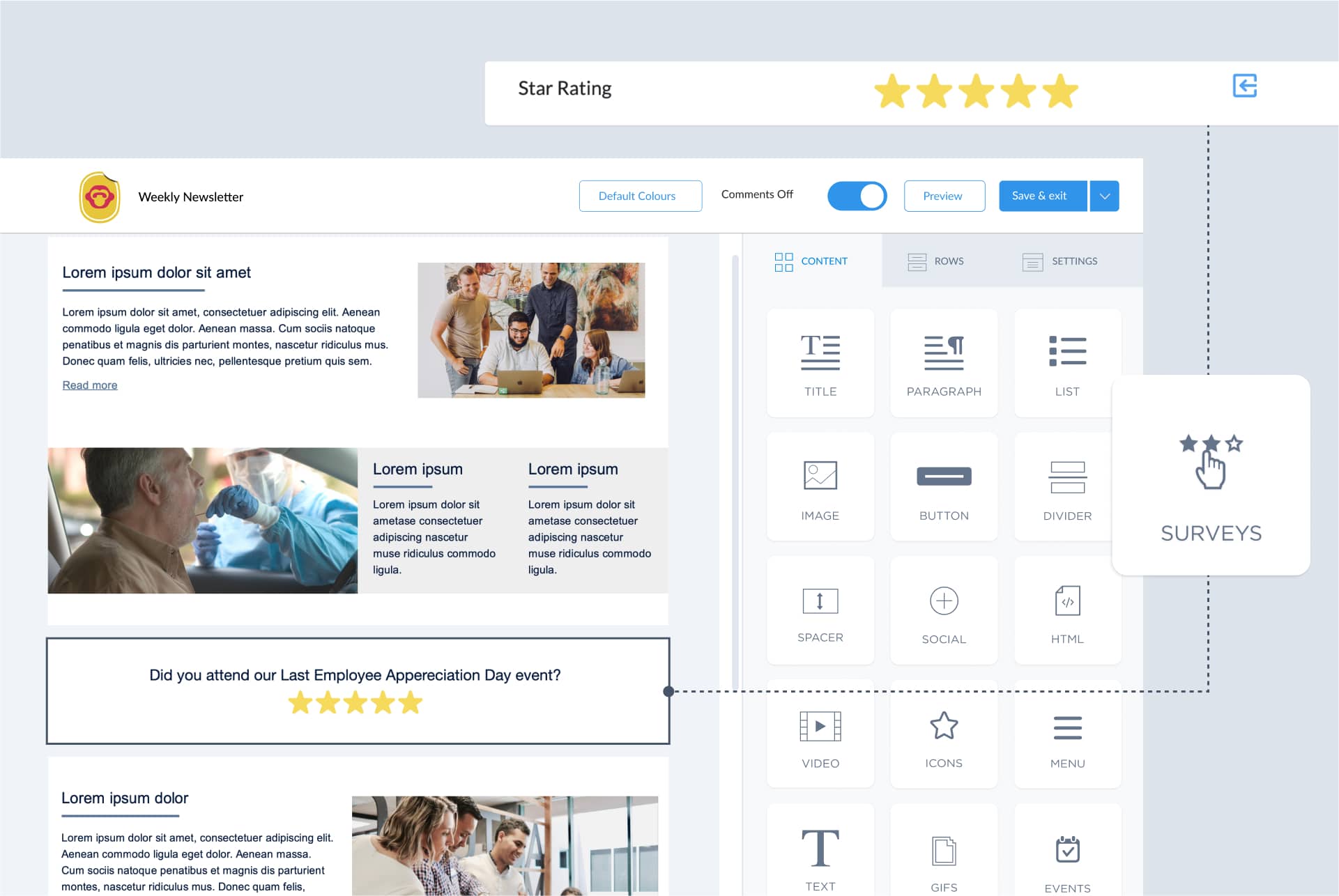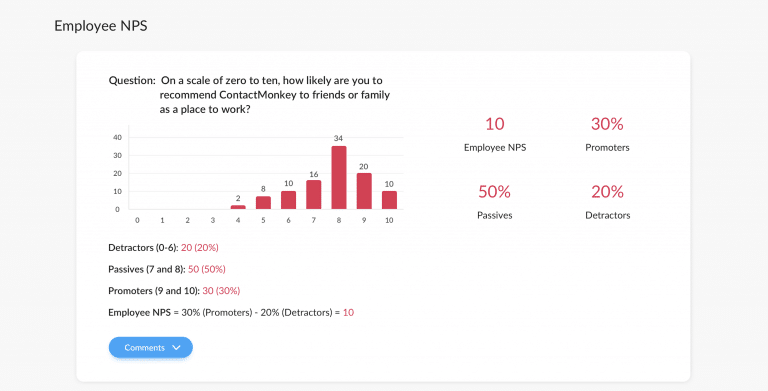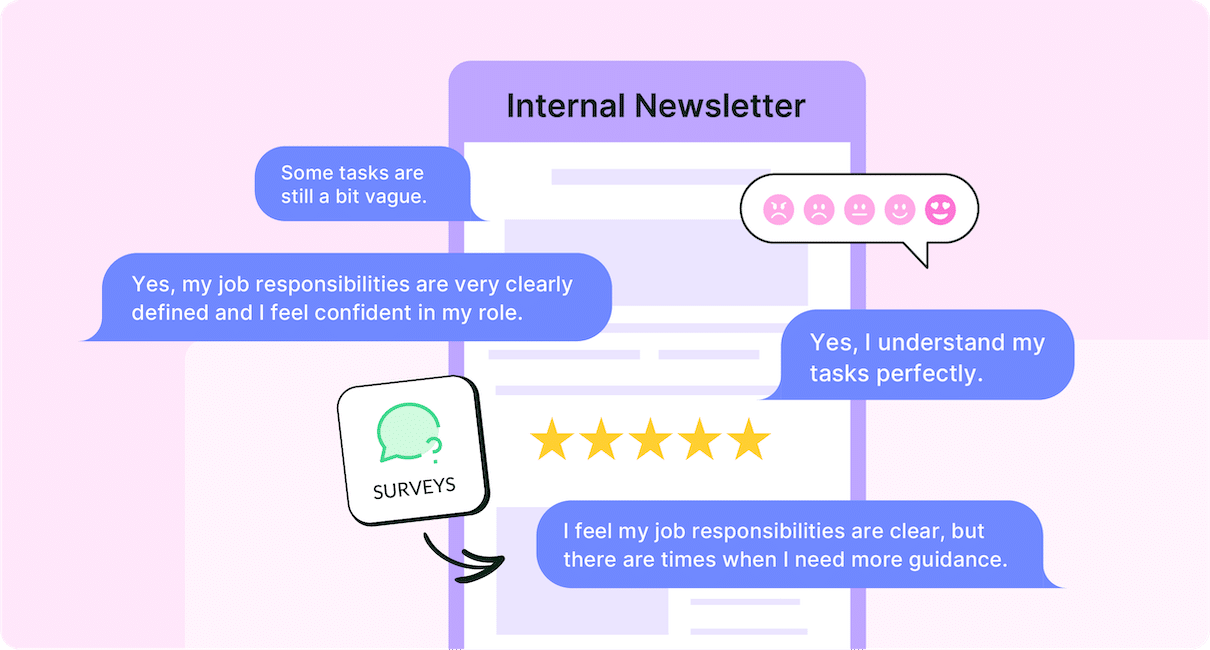Ever wonder why some companies have a workforce buzzing with enthusiasm while others struggle with disengaged employees and high turnover? The secret might be simpler than you think: employee surveys. Read on as we share why employee surveys are important.
Employee surveys are more than just a box-ticking exercise. They’re a direct line to the heart of your company: your employees. Giving your team a voice gains you valuable data while also showing employees that you value their input. This simple act can drive engagement, improve retention, and ultimately contribute to your company’s success.
In this post, you’ll learn why employee surveys are not just important but essential for organizations aiming to thrive in today’s competitive business landscape.
We’ll explore why employee surveys are important and benefit your organization—from improving employee engagement to driving organizational change. Whether you’re an HR professional looking to refine your employee survey best practices or a manager seeking to boost team performance, read on—you’re about to discover why employee surveys are the secret weapon you’ve been looking for.
Revive employee engagement with targeted, interactive emails and newsletters
Book a 15 minute call with one of our team members
What Are Employee Surveys?
Employee surveys serve as a structured method for companies to understand the thoughts, feelings, and opinions of their staff. They typically consist of a series of questions that can range from simple yes/no responses to more detailed open-ended queries.
These surveys are designed to collect information on various aspects of the workplace, such as employee experience, job satisfaction, workplace culture, and more.
The purpose of these surveys is multifaceted. They may seek to:
- Gauge employee satisfaction and engagement
- Identify areas of improvement within the organization
- Measure the effectiveness of company policies and initiatives
- Provide employees with a voice in the decision-making process
The content of employee surveys can also vary widely depending on the organization’s goals. Survey questions may ask employees about:
- Work-life balance
- Relationship with managers and colleagues
- Career development opportunities
- Company culture and values
- Workplace environment and resources
- Team communication effectiveness
- Understanding of company goals and strategy
By regularly conducting these surveys, companies create a feedback loop that allows them to continuously improve their workplace, boost employee morale, and ultimately drive better business outcomes. The importance of employee surveys is not just their use as a measurement tool, but as a vital component of a company’s strategy for fostering a positive and productive work environment.
Why Are Employee Surveys Important?
Employee surveys provide organizations with invaluable insights into their workforces, serving as a direct line of communication between employees and management. They offer a structured way to gather employee feedback and uncover hidden issues, highlight areas of success, and identify opportunities for improvement within an organization.
By conducting regular surveys, companies can track trends over time, measure the impact of initiatives, and make proactive, data-driven decisions that lead to continuous improvement in employee satisfaction and engagement. That’s why employee surveys are so important to your overall employee feedback and communication strategy— they provide the foundation for all further strategic planning.
Watch ContactMonkey on demand
Explore features to streamline your internal comms and measure impact.
7 Reasons Why Employee Surveys Matter
Now that we’ve covered why employee surveys are important at a high level, let’s talk specifics. When used correctly, employee surveys help you transform your organization for the better. Let’s take a closer look at seven key reasons why employee surveys should be an essential part of your business strategy.
1. Surveys help you understand how to drive employee engagement
Having an issue with employee engagement? Employee surveys are a great way to identify what truly motivates your team and pinpoint areas that need improvement.
Plus, giving your employees a voice shows them their opinions matter, which in itself is a huge engagement booster. And when you act on the feedback you receive, you’re creating a cycle of continuous improvement that keeps your workforce invested and enthusiastic.
To dig deeper into the engagement drivers within your organization, consider using an employee engagement survey to get specific insights. And don’t forget to regularly measure employee satisfaction to keep your finger on the pulse of your team’s happiness.
2. Surveys help you anticipate turnover and retain talent
High turnover is a headache for any organization. The good news? Employee surveys can be your retention superpower.
Checking in with your team regularly provides the opportunity to spot potential issues before they lead to resignations. Maybe it’s a lack of growth opportunities, or perhaps there’s a communication breakdown with management. Whatever the case, surveys give you the intel you need to address these issues head-on.
Remember, measuring employee engagement isn’t just about numbers—it’s about understanding the story behind those numbers. Once you have that understanding, you can create an employee engagement action plan that keeps your top talent right where you want them—with your company.
3. Surveys are a balanced part of your complete communication strategy
In the world of business, communication is king. And employee surveys? They’re your communication crown jewels.
Why are employee surveys important for communication? A two-way dialogue between management and employees is crucial for building trust and transparency within your organization. Surveys are an easy way to provide a structure for those conversations, allowing you to ask for specific and targeted feedback.
To get the most out of this communication channel, don’t forget to allow open-ended survey questions that allow for more detailed and nuanced responses. And don’t underestimate the power of a quick pulse survey to keep the lines of communication open between larger, more comprehensive surveys.
Join us weekly for a live demo
Your questions about ContactMonkey, answered. Every Thursday at 12 PM ET.
4. Surveys are the first step towards organizational change for the better
Change is inevitable in business, but making positive changes and getting employees aligned require concentrated effort. Employee surveys can be a powerful catalyst for driving and managing change in your organization.
The importance of employee feedback surveys is not only in getting employees’ input on the types of changes employees believe necessary but also in keeping tabs on how any ongoing changes are landing with employees. In other words, employee pulse surveys are a crucial part of your change management strategy.
By taking a data-driven approach to change management, you can make informed decisions that align with your employees’ needs and expectations. To truly harness the power of surveys for organizational change, make sure you’re sending out surveys on a regular basis to track progress over time and identify trends.
5. Surveys pave the way for a more productive team
Engaged employees are productive employees. It’s as simple as that. By using surveys to gauge and improve engagement, you’re indirectly boosting productivity across your organization. When employees feel heard and valued, they’re more likely to go the extra mile, come up with innovative ideas, and contribute to a positive work environment.
Consider using software for pulse surveys to keep a consistent eye on engagement levels. And make sure to actually pay attention to the insights you glean. After all, as your boots on the ground, your employees will often have the best knowledge of where the inefficiencies in your organization might be. If you’re looking for ways to boost productivity, listening to your employees is a great place to start.
6. Surveys foster a positive workplace culture
Another reason why employee surveys are important is their ability to create a stronger company culture.
Culture isn’t just about ping pong tables and casual Fridays. It’s about creating an environment where employees feel valued, respected, and motivated. Regular surveys help you build a culture of trust and transparency. They show your employees that their opinions matter and that you’re committed to creating a workplace that works for everyone.
To make the most of your surveys in building a positive culture, pay attention to your employee survey response rates. High participation rates are a good indicator of trust in the process. And don’t forget to share the employee survey results with your team—transparency goes a long way in fostering a positive culture.
7. Surveys help you prove the ROI of your initiatives
Last but certainly not least, employee surveys provide a concrete way to measure the return on investment (ROI) of your employee engagement initiatives. They help you quantify the impact of your efforts and justify further investments in employee engagement programs.
By consistently measuring employee engagement, you can track improvements over time and correlate these with other business metrics like productivity, customer satisfaction, and profitability. And with thorough employee survey analysis, you can identify which initiatives are having the biggest impact, allowing you to allocate resources more effectively.
Find your pricing plan
Your budget matters. Get a custom quote for ContactMonkey.
Take the next steps with your employee survey results action plan.
How to Implement Effective Employee Surveys
Whether you’re just starting off with an employee survey strategy or are struggling to get responses from your team, there’s always more you can do to boost your survey response rate. An employee survey’s importance can’t be understated, so here are some key tips and best practices to ensure yours are successful:
Define Clear Objectives
Before creating your survey, establish specific goals. What information do you want to gather? How will you use the results? Clear objectives will guide your question design and ensure you collect relevant data.
Respect Your Employees’ Time
To get actually useful results from your surveys, be careful about balancing thoroughness and the possibility of communications overload. Longer and more frequent surveys can definitely get you more feedback, but if you’re sending out a multi-page survey every month, you’re going to see a steep dropoff in responses.
Most of the time, you want to keep surveys brief and focused. To encourage employees to complete them, aim for surveys that take no more than 10-15 minutes to answer in full.
You should also be strategic about your sending frequency and consider whether annual, quarterly, or even event-driven surveys best suit your organization’s needs.
Select User-Friendly Employee Survey Tools
It’s safe to say we all know the importance of employee feedback surveys. To better understand your employees, you’ve got to ask the right questions with as few barriers as possible. Luckily, the best employee pulse survey tools make the process pretty much seamless.
Tools like ContactMonkey make it easy for organizations to incorporate regular pulse surveys into their employee feedback strategy.
Using ContactMonkey’s drag-and-drop email builder, you can embed a pulse survey in any internal employee emails or newsletters you send. It’s as simple as grabbing a survey block and dropping it wherever you want it, then selecting the survey types. Choose from multiple options like yes/no, star ratings, emoji reactions, eNPS surveys, and more.

ContactMonkey also allows you to enable anonymous commenting so that employees can add more in-depth written answers alongside their quick responses. By allowing your team to answer anonymously, you increase the likelihood that your employee opinion survey captures their candid thoughts.
Surveys reach employees in their own inbox, no second app or platform required. And because all HTML emails built in ContactMonkey are fully responsive, surveys are equally easy to answer on desktop and mobile.
Plus, when you send a pulse survey through ContactMonkey, you get access to a detailed campaign dashboard that shows you not only your survey responses, but in-depth analytics on everything to do with your emails to give you more context for your survey data.
ContactMonkey will even calculate your eNPS scores for you.

By following these best practices, you can create and conduct employee surveys that yield valuable insights and drive meaningful improvements in your workplace. Remember, the goal is not just to collect data but to use that information to enhance employee engagement, satisfaction, and overall organizational performance.
Learn more about how to leverage pulse surveys in all of your internal communications and internal emails.
Don’t Let Your Employees’ Wisdom Go to Waste
Employee surveys should be more than just a box to check off on your HR to-do list. You’re not just collecting data for the sake of it—you’re building trust, driving engagement, and paving the way for meaningful change.
Knowing the importance of employee surveys is where it starts, but the real magic happens when you’re acting on the insights you gather. Are you ready to unlock the full potential of your workforce?
Don’t let this opportunity slip away. Take the next step in your employee engagement journey today. Book a demo with ContactMonkey to discover how our innovative survey tools can help you create a more engaged, productive, and satisfied workforce. Your employees (and your bottom line) will thank you.
Are you ready to start collecting feedback from your internal emails? Book your free demo of ContactMonkey today.


